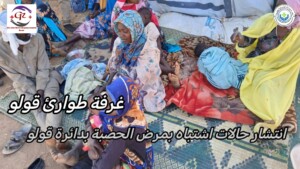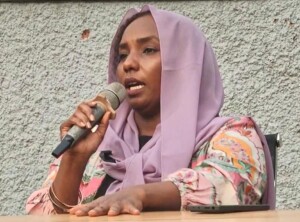Diarrhoea, healthcare shortages in Kordofan, Khartoum
Seven people have been infected with severe diarrhoea at Abu Jubeiha in South Kordofan. The infection believed to be acute watery diarrhoea, is often caused by cholera.
 How to prevent the spread of cholera (Sudanese Doctors' Union)
How to prevent the spread of cholera (Sudanese Doctors' Union)
Seven people have been infected with severe diarrhoea at Abu Jubeiha in South Kordofan. The infection believed to be acute watery diarrhoea, is often caused by cholera.
A health source reported to Radio Dabanga that Abu Jubeiha hospital has received seven cases of the disease during the past two days.
Patients in Um Rawaba in North Kordofan have complained of lack of treatment and health care at the town’s health centres due to lack of doctors.
A number of residents told Radio Dabanga that about 50 patients were seen by one doctor on Sunday, while dozens returned without treatment.
They pointed to the lack of doctors and medicines in the hospital during the Eid.
High fees
They explained that the fee for seeing a specialist ranges between SDG100 (*$3.50 and SDG200 ($7).
A health source said that five health insurance specialists in North Kordofan have resigned in protest against the conditions set by the insurance department to see 80 patients a day.
A number of patients in Khartoum have complained about the lack of intensive care rooms in public and private hospitals, as well as the lack of access to blood and blood products, prompting people to call on social media to reach out to donors to save their relatives.
A number of residents have also complained of the lack and scarcity of psychiatric and neurological medicines in the pharmacies, including those of the National Fund for Medical Supplies.
Suspected cholera
Sudan has experienced an epidemic since 2016 which the Sudanese government insists on calling ‘watery diarrhoea’ in spite of numerous independent confirmations (conducted according to WHO standards) that the disease which broke out in Blue Nile state in August 2016 was cholera, the Sudanese authorities and several international organisations persistently refer to it as ‘acute watery diarrhoea’.
The WHO and the Sudanese Ministry of Health reported in mid-October that the total number of recorded cases reached more than 35,000 people – including 800 related deaths. Doctors of Sudan’s National Epidemiological Corporation reported in early July however, that nearly 24,000 Sudanese had been infected and 940 cholera patients died.
In May, Sudan’s federal Minister of Health, Bahr Idris Abu Garda, declared that Sudan is now free of the 'watery diarrhoea' outbreak (suspected to be cholera) that hit various parts of the country during the past year.
Cholera key facts (Source: WHO)
- Cholera is an acute diarrhoeal disease that can kill within hours if left untreated.
- Researchers have estimated that each year there are 1.3 million to 4.0 million cases of cholera, and 21 000 to 143 000 deaths worldwide due to cholera.
- Most of those infected will have no or mild symptoms, and can be successfully treated with oral rehydration solution.
- Severe cases will need rapid treatment with intravenous fluids and antibiotics.
- Provision of safe water and sanitation is critical to control the transmission of cholera and other waterborne diseases.
- Safe oral cholera vaccines should be used in conjunction with improvements in water and sanitation to control cholera outbreaks and for prevention in areas known to be high risk for cholera.
- A global strategy on cholera control with a target to reduce cholera deaths by 90 per cent was launched in 2017.
* Based on the indicative US Dollar rate quoted by the Central Bank of Sudan (CboS)
Follow #CholeraInSudan, #الكوليرا_السودان for ongoing coverage by Radio Dabanga











 and then
and then